Protista
Protista is a diverse group of eukaryotic microorganisms that do not fit into the other kingdoms of plants, animals, or fungi. They are mostly unicellular but some are multicellular. Protists can be found in various environments including freshwater, marine, and terrestrial habitats. They play important roles in ecosystems as producers, consumers, and decomposers.
Characteristics of Protista:
- Eukaryotic: Protists have cells with a true nucleus and other membrane-bound organelles.
- Unicellular or multicellular: Most protists are unicellular, but some, like algae, can be multicellular.
- Diverse modes of nutrition: Protists can be photosynthetic, heterotrophic, or mixotrophic.
- Motility: Many protists have structures like flagella, cilia, or pseudopodia that allow them to move.
Types of Protists:
Protists are classified into several groups:
- Protozoa: Unicellular, heterotrophic protists that are capable of movement. They include amoebas, paramecia, and trypanosomes.
- Algae: Photosynthetic protists that can be unicellular, colonial, or multicellular. Examples include diatoms, green algae, and red algae.
- Slime molds: Unicellular or multicellular protists that have a unique life cycle involving a transition between solitary amoeboid and multicellular stages.
Importance of Protists:
Protists are crucial for various ecological processes:
- Primary producers: Photosynthetic protists form the base of many aquatic food chains.
- Food source: Many aquatic organisms rely on protists as a food source.
- Carbon cycling: Protists play a role in the cycling of carbon and other nutrients in aquatic ecosystems.
Study Guide for Protista:
- What are the key characteristics of protists?
- Describe the different types of protists and provide examples of each.
- Explain the ecological importance of protists in various habitats.
- Compare and contrast the modes of nutrition in protists.
- Discuss the role of protists in aquatic food chains.
[Protista] Related Worksheets and Study Guides:
.◂Science Worksheets and Study Guides Seventh Grade. Weathering of rocks and soil formation
Study Guide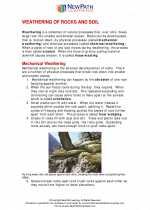 Weathering of rocks and soil formation
Weathering of rocks and soil formation  Activity Lesson
Activity Lesson Weathering of Rocks
Weathering of Rocks  Worksheet/Answer key
Worksheet/Answer key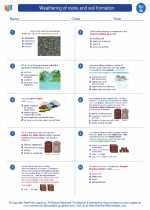 Weathering of rocks and soil formation
Weathering of rocks and soil formation  Worksheet/Answer key
Worksheet/Answer key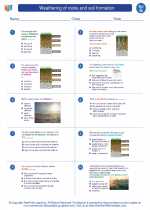 Weathering of rocks and soil formation
Weathering of rocks and soil formation  Worksheet/Answer key
Worksheet/Answer key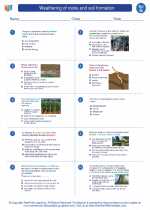 Weathering of rocks and soil formation
Weathering of rocks and soil formation  Worksheet/Answer key
Worksheet/Answer key Weathering of rocks and soil formation
Weathering of rocks and soil formation  Vocabulary/Answer key
Vocabulary/Answer key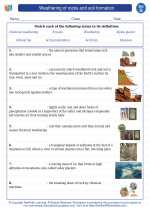 Weathering of rocks and soil formation
Weathering of rocks and soil formation  Vocabulary/Answer key
Vocabulary/Answer key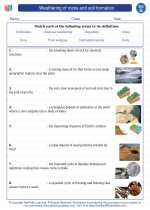 Weathering of rocks and soil formation
Weathering of rocks and soil formation  Vocabulary/Answer key
Vocabulary/Answer key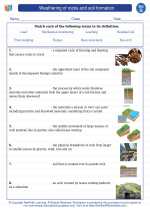 Weathering of rocks and soil formation
Weathering of rocks and soil formation  Vocabulary/Answer key
Vocabulary/Answer key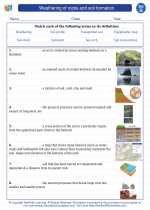 Weathering of rocks and soil formation
Weathering of rocks and soil formation 

 Activity Lesson
Activity Lesson
 Worksheet/Answer key
Worksheet/Answer key
 Worksheet/Answer key
Worksheet/Answer key
 Worksheet/Answer key
Worksheet/Answer key
 Worksheet/Answer key
Worksheet/Answer key
 Vocabulary/Answer key
Vocabulary/Answer key
 Vocabulary/Answer key
Vocabulary/Answer key
 Vocabulary/Answer key
Vocabulary/Answer key
 Vocabulary/Answer key
Vocabulary/Answer key

The resources above cover the following skills:
LIFE SCIENCE
Unity and Diversity
Analyze and interpret data for patterns of change in anatomical structures of organisms using the fossil record and the chronological order of fossil appearance in rock layers.